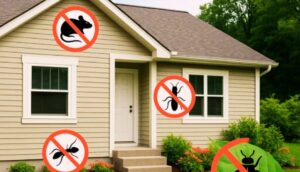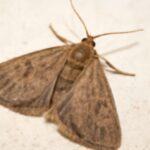How to Get Rid of Frogs in Your Yard

Frogs are a part of our ecosystem, but many people are hung up on their presence and would not dare to get close to them because of their hopping nature, and to many, they are cool and slimy. But with all of that said, the major role that frogs play is to bring balance to our ecosystem. For example, frogs will feed on disease-carrying insects like flies and mosquitoes.
Frogs also feed on slugs and snails that are known to damage many species of garden plants. A frog’s diet also consists of spiders, so despite the many hordes of frogs, they do their part in the control of garden pests. But despite what was said, your desire may still be to deter frogs from your yard or at least seek to limit the number that may pay your yard or garden a visit. If that is you, then continue reading to find out how to get rid of frogs in your yard.
As an Amazon Associate, I earn from qualifying purchases
What Attracts Frogs to Yards and Gardens
Frogs are attached to yards and gardens because of the insects they are in search of, or it could be a body of water, such as a pond, a lake, or even a creek nearby. A Birdbath can also attract frogs, along with standing water that may be collected in outdoor containers and other vessels. Certain plants have a center cup that collects and holds rainwater, such as some bromeliads that will also attract frogs, mosquitoes, and centipedes. Getting rid of these water sources will discourage the presence of frogs.
Pro Tip: Swap your regular bulbs for ( Yellow Bug Lights) to reduce insects at night and make your yard less appealing to frogs.
The Disadvantages of Frogs in Your Yard and Garden
Now I know that we have discussed the benefits of having frogs around, but there are also some disadvantages, so it’s like a bitter-sweet situation, or as some would say, “you can’t win for losin.g” Here are some reasons why having frogs around may not be such a good idea.
- Frogs can cause a startle: There is nothing more startling than taking a walk in your garden or resting in your garden and having a frog leap on you; it can be pretty scary at first.
- Frogs attract snakes: These slithery creatures can cause a scare of walking up on them unexpectedly. Snakes use frogs as a food source, a nd if your yard or garden is teaming with frogs, expect the presence of snakes. Besides, snakes are poisonous, and caution should be taken.
- Frogs make loud noises: Especially if you’re trying to sleep, there is nothing like a croaking frog that will keep you awake.
- Frogs carry disease: Frogs are known to carry diseases such as Salmonella, which is a common bacterium; they also carry various pathogens that can spread to humans and pets.
- Some frogs are poisonous: Frogs that possess unique patterns and bright colors are usually poisonous, even though these frogs might not venture outside of their habitat. It’s still important to identify and take caution with any frog you might come in contact with.
- Some Frogs are invasive: Non-native frogs and toads can hurt our ecosystem because they’ll be competing with other natural species for resources.
How to Get Rid of Frogs
- Get Rid of Hiding Spots: Tall rocks, leaf debris, or litter are places where frogs will seek to take refuge. Keeping your grass cut low, cleaning up, and removing leaf litter will discourage frogs from your yard.
- Get Rid of Water Sources: Standing or stagnating water will not only attract frogs but also mosquitoes and rodents. It’s important to get rid of all containers and other objects that collect and hold water. Consider using a Mosquito Dunk for Standing Water to make it less attractive to both frogs and mosquitoes.
- Fake Predators: Frogs’ natural predators are snakes, birds, lizards, and small mammals. The addition of fake predators to your yard or garden will scare frogs a scare and cause them to stay clear of your yard.
- Turning off Outdoor Lighting: If possible, turn off your outdoor lights at night because night lights will attract insects that frogs use as a food source, causing frogs to show up on your doorstep. If there is no night light, then there will be no insects and no frogs. Lights attract insects, which in turn attract frogs. Swap to Motion-Sensor Solar Lights instead, which only turn on when needed
- The application of vinegar: The application or spraying of vinegar in areas where frogs like to hang out will cause their feet to have a stinging sensation, driving frogs away or causing them to change their location.
- Pest Control Company: Calling in a pest control company to bring frog control is another way to get rid of frogs. You will have to pay a fee, but at least your frog issue will be solved.
- Citrus and Garlic Repellant: Apply natural, homemade citrus or garlic repellents around the edge of your pond. Cut up garlic cloves or citrus peels into small pieces, followed by sprinkling around rocks and plants surrounding the water. Each week, reapply. Try a ready-made Natural Outdoor Pest Repellent Spray.
- Install Fine Mesh Fencing: After eliminating frogs, install fine-mesh fencing to keep them from entering back into your yard or garden.
10 Frequently Asked Questions (FAQs)
1. Why are frogs hanging around my home in the first place?
Frogs are usually drawn to your property because it offers food, moisture, and shelter. If you have lots of insects, standing water (like ponds or puddles), or dense vegetation, frogs will feel right at home. Eliminate these attractions, and you’ll make your yard less frog-friendly!
2. Are frogs dangerous to humans or pets?
Most frogs are harmless, but some species secrete toxins that can irritate skin or harm pets if ingested. Cane toads, for example, are toxic to dogs and cats. It’s best to keep pets away from unfamiliar frogs and use gentle, non-contact removal methods when possible.
3. What smells or substances naturally repel frogs?
Frogs don’t like the smell of vinegar, coffee grounds, and citrus. A simple spray made with vinegar and water can be applied around entry points and moist areas to deter them. However, be very careful where you spray because vinegar can damage grass and plants.
4. How can I humanely remove frogs from my yard?
You can gently relocate frogs using gloves or a small container. Release them in a safe, damp environment far from your home—like a creek or wooded area. Also, reduce standing water and overgrown bushes to make your yard less inviting; however, some frogs are poisonous. Coming in contact with their skin can cause serious health issues or even death; therefore it is better to call in those who are trained, like a pest control company or persons that are trained in wildlife removal.
5. Can I use salt to get rid of frogs?
Technically, yes—but it’s not humane. Salt will dehydrate frogs and leading to pain or death. It’s best to use eco-friendly methods that encourage frogs to move along rather than harm them.
6. Will removing bugs help reduce frogs?
Absolutely! Frogs feast on insects like mosquitoes, flies, and moths. By using insect-reducing solutions like yellow bug lights, natural repellents, or removing standing water, you reduce their food source—making your yard less attractive to frogs.
7. How do I keep frogs away from my porch or patio?
The use of motion-activated lights, vinegar spray, or even a light mesh barrier. Keeping the area well-lit and dry discourages frogs from hanging out. Also, avoid leaving pet food or open water bowls outside overnight.
8. What’s the best long-term solution for frog infestations?
Habitat control is key. Fixing outdoor faucets that are leaking, clearing away debris, trimming overgrown plants, and eliminating standing water will help greatly. Regular maintenance makes your yard unappealing to frogs long-term without the need for harsh chemicals.
9. Are there any commercial frog repellents that will work?
Yes, there are non-toxic frog repellents available online or at garden centers. Look for ones labeled as safe for pets and wildlife. These often use natural oils or scents that frogs dislike and are safe for garden use.
10. Can frogs come inside the house? How do I stop that?
Yes, especially if doors or windows are left open or there’s a gap in your home’s foundation. Seal cracks, install weather stripping, and keep doors closed. If a frog gets indoors, catch it and release it outdoors back into the wild.
Conclusion
Frogs are a part of our ecosystem and like other wildlife that shows up at our doorstep they are in search of a food and water source and a place to lay eggs, but if you have a frog issue and want to keep them out of your yard and garden or if you are looking for ways to keep frogs at bay then this guide will provide the help that will cause you to have a frog free zone. Although there are benefits in having them around, there are also disadvantages to their presence so you can decide from this list if they are worth having around or if you would be far better off without having them around.










Hey, this article really resonated with me! While I understand the benefits frogs bring to the ecosystem, their sudden jumps can be a bit unnerving, especially when I’m out in the yard. I’ve actually dealt with a frog invasion before, and getting rid of standing water made a huge difference. Also, I found that using vinegar in their hangout spots worked wonders. Balancing the benefits of frogs with the practical need to keep them out of certain areas is definitely a challenge, but these tips are super helpful!
Hello, so good to hear that you can identify what I am talking about. I am so happy to help. Thanks for stopping by and commenting.